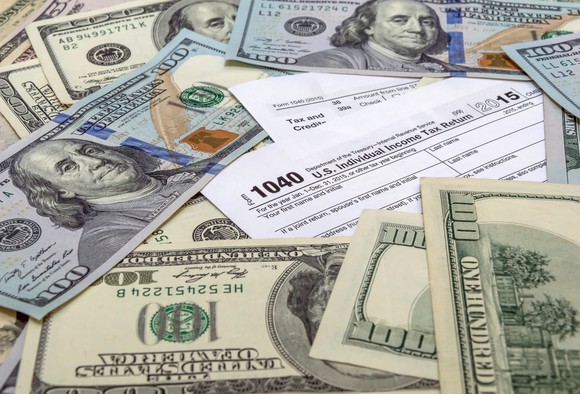How does Warren Buffett pay a lower tax rate than his secretary? Here’s the answer.
Capital gains: It’s not “income” until you sell
Last year, Warren Buffett reported about $11.6 million in gross income on his tax return, and paid $1.85 million in federal income taxes. His 16% effective tax rate already sounds low, until you consider that his net worth increased by $12 billion in 2016. In fact, Warren Buffett’s tax rate as a percent of his wealth is a paltry 0.002%.
The reason many wealthy Americans pay such a low tax rate is that capital gains and dividends (most investment income) are taxed at more favorable rates than earned income. So, if Warren Buffett receives a $1 million dividend from an investment, he’ll pay a tax rate of 23.8% (20% for capital gains and 3.8% for the additional tax on certain investment income). Meanwhile, if a surgeon earned $1 million from his or her job, he or she would pay a top tax rate of 39.6% on that income.
In addition, capital gains taxes are not assessed until the investment is sold. This is why Buffett didn’t pay a dime of income taxes on the $12 billion gain in net worth. Virtually all of that gain was in the form of his Berkshire Hathaway stock, so none of it was considered income by the IRS.
Maximizing retirement accounts
If you contribute to a traditional IRA, you can set aside $5,500 ($6,500 if you’re 50 or older), which will be deducted from your taxable income. Through a 401(k) or similar retirement plan at work, you can choose to have up to $18,000 of your income ($24,000 if 50 or older) deferred into your account. And even better yet, certain pension plans and self-employment retirement plans allow contributions of up to $54,000 ($60,000 for those over 50) that will not count toward your taxable income.
In other words, if a 50-year-old business owner earns $300,000 in profit this year, he or she can shelter up to $60,000 of it in a tax-deferred retirement account and avoid paying taxes on that $60,000.
The mortgage interest deduction
This is a tax deduction available to everyone, but is used much more often by wealthy people. For starters, you need to itemize deductions in order to take advantage of it, which is a more common practice among higher income brackets. So even though many low- to middle-income taxpayers pay a mortgage, they can’t deduct their mortgage interest.
In fact, in a recent tax year, the mortgage interest deduction was taken on about 71% of higher-earners’ tax returns, but just 20% of returns with AGI under $200,000.
Rich people tend to get more creative with this deduction as well. Under current IRS law, you can deduct interest on up to $1 million in mortgages on a first or second home. In a 2016 interview, TaxAudit.com’s Dave DuVal shared a story about one taxpayer who successfully claimed the interest on a yacht loan, since it technically met the IRS’s definition of a “home.”
Donating stock
Instead of donating cash to charitable organizations, many wealthy individuals donate appreciated assets, like stock. In fact, Warren Buffett, who has pledged to give away virtually all of his money to charity, makes his annual donations in Berkshire Hathaway stock.
By donating stock, not only do people never have to pay taxes on their capital gains, but they can deduct the full market value. For example, if a wealthy individual donates $100,000 in stock, which they originally paid $25,000 for, they avoid paying capital gains on the $75,000 investment profit and get to deduct the full $100,000 market value of the stock as a charitable contribution.
The bottom line
To be fair, all four of these tax breaks are available to middle-class Americans as well as wealthy individuals. In fact, my wife and I are certainly not members of the 1%, yet we take advantage of the mortgage interest deduction every year, shelter as much income as possible in retirement accounts, and have several investments that would trigger substantial capital gains taxes if we were to sell.
The point is these are tax breaks that, in practice, tend to disproportionately benefit rich people. However, you may be able to take advantage of some of these as well.
The $6,269 tax bonus millions of Americans completely overlook
Taxes can be confusing and downright miserable. But a handful of “tax tricks” could help millions of Americans save thousands of dollars. That’s free money you could be leaving on the table. For example: the IRS believes that a full 20% of eligible Americans miss out on a tax break worth up to $6,269… each year! Simply click here to discover how to learn more about these strategies.
The Motley Fool has a disclosure policy.














